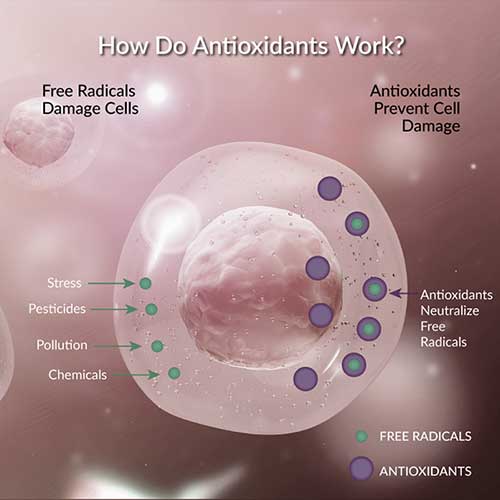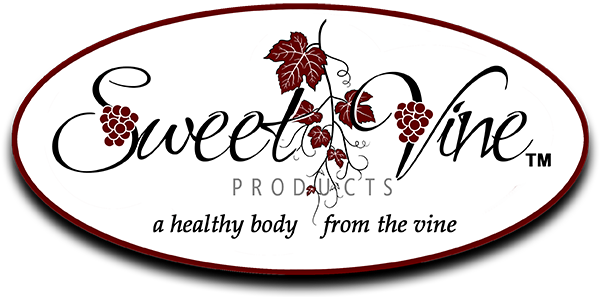Antioxidants
What are they? What do they do?
Antioxidants are molecules that counteract the damaging process of oxidation. Antioxidants can safely interact with free radicals and can help by terminating the chain reaction before vital molecules are damaged.
There are thousands of antioxidants that can be found in the fruits and vegetables we eat, some more than others, but no single antioxidant can combat the effects of every free radical. Different antioxidants help with different areas of the body to help repair or prevent cell damage.

Resveratrol
What is it? What can does it do?
A type of polyphenol found to protect you against diseases like Cancer, Diabetes, and Alzheimer's. Studies have shown reversatrol reduces the risk of many types of cancer cell development. Other studies have shown other positive effects including:
Polyphenols
What are they? What do they do?
Beneficial micronutrients naturally found in plant-based foods, Polyphenols are a group of phytochemicals characterized by their chemical structure, which includes multiple phenolic rings. These compounds are synthesized by plants as a defense mechanism against environmental stressors, including UV radiation and pathogens. When we consume foods rich in polyphenols, these beneficial compounds offer us a range of well-being favor, thanks to their antioxidant, anti-inflammatory, and immune-modulating properties. The Muscadine produce more Polypheniols due to having an extra chromosome that other fruits don't have.
THERE ARE MANY:
Anthocyanidins
Catechin
Cinnamic Acid
Cyanidin
Delphinidin
Ellagic Acid
Epicatechin Gallate
Epigallocatechin
Flavonoids
Ferulic Acid
Gallate
Gallic Acid
Geraniol
Kaempferol
Malvidin
Myricetin
OPCs (oligomeric proanthocyanidins)
Peonidin
Petunidin
Quercetin
Resveratrol
Rutin
Tartaric Acid
Vanillic Acid
Quercetin, Ellagic Acid, Flavonoids, OPCs
What they do?
The Research
08/30/2023: New! - Muscadine's Health Potential
"Scientists zero-in on polyphenols in a North American grape that could make it a medicinal superfood"
Muscadines: A Powerhouse of Health Benefits
"Their rich flavor are an old Southern favorite with outstanding health benefits."
Muscadine Health Benefits: Research Interview
"Muscadine's investigated at Wake Forest University School of Medicine contains over 70 distinct polyphenols."
Critical Article: Muscadine's Health Benefits
"The major advantage to the use of a Muscadine Extract as a treatment is efficacy for the disease of interest with limited side effects."
13 Amazing Muscadine Juice Health Benefits
"Raw juice is digested quickly and easily, allowing us the opportunity to increase our body's natural digestive efficiencies and boost immunity."
Muscadine Grapes Inhibits Triple-Negative Breast Tumor Growth
"These results indicate that MGE inhibits tumor growth in association with a reduction in cyclin D1 and E2F target protein Ki67."
Human Clinical Trials on Muscadines
"Men with heightened risk of prostate cancer aggressivity due to an SOD2 Ala/Ala polymorphism, PSA doubling time increased by 10.3 months, suggesting muscadine may be of particular benefit to men with this genotype."
Super Grapes: The Next-Gen Superfruit?
"In addition to the high content of antioxidants in Muscadine grape products and extracts, compounds in Muscadine also stimulate the body’s own antioxidant protection mechanisms."
The Original American Grapes: The Hero Polyphenol Antioxidants
"Resveratrol, quercetin, and other polyphenol antioxidants are found naturally in high concentration in muscadine grapes. These compounds are researched to be the future of immune superfoods."
America's First Grape: The Muscadine
"If you don't drink wine, try some jam or a muffin made from muscadines. They're an even better source of resveratrol."
Muscadine research promises a new category, between table grapes and berries
"The fruit has long served to make wine, due to its floral aroma and flavor profile. But Worthington envisions muscadine becoming a fresh fruit category that falls somewhere between grapes and berries at the supermarket."
Muscadine Grapes: A New Health Food and an Alternative Crop
"The muscadine’s newfound health benefits could boost the crop in the Southeast. And Magee and ARS colleagues have developed growing methods that reduce the time needed to produce a commercial crop from 5 years to 3 years."









